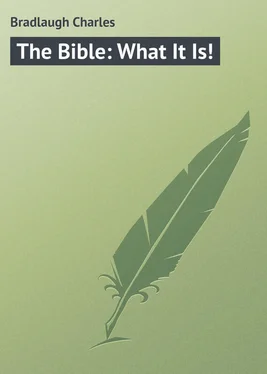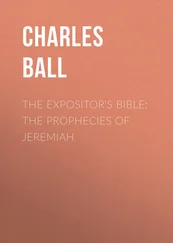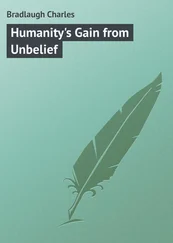Charles Bradlaugh - The Bible - What It Is!
Здесь есть возможность читать онлайн «Charles Bradlaugh - The Bible - What It Is!» — ознакомительный отрывок электронной книги совершенно бесплатно, а после прочтения отрывка купить полную версию. В некоторых случаях можно слушать аудио, скачать через торрент в формате fb2 и присутствует краткое содержание. Жанр: foreign_prose, на английском языке. Описание произведения, (предисловие) а так же отзывы посетителей доступны на портале библиотеки ЛибКат.
- Название:The Bible: What It Is!
- Автор:
- Жанр:
- Год:неизвестен
- ISBN:нет данных
- Рейтинг книги:5 / 5. Голосов: 1
-
Избранное:Добавить в избранное
- Отзывы:
-
Ваша оценка:
- 100
- 1
- 2
- 3
- 4
- 5
The Bible: What It Is!: краткое содержание, описание и аннотация
Предлагаем к чтению аннотацию, описание, краткое содержание или предисловие (зависит от того, что написал сам автор книги «The Bible: What It Is!»). Если вы не нашли необходимую информацию о книге — напишите в комментариях, мы постараемся отыскать её.
The Bible: What It Is! — читать онлайн ознакомительный отрывок
Ниже представлен текст книги, разбитый по страницам. Система сохранения места последней прочитанной страницы, позволяет с удобством читать онлайн бесплатно книгу «The Bible: What It Is!», без необходимости каждый раз заново искать на чём Вы остановились. Поставьте закладку, и сможете в любой момент перейти на страницу, на которой закончили чтение.
Интервал:
Закладка:
Verses 16 and 17. It is a matter of great difficulty to refrain from ridiculing the statement that there exist trees bearing such fruit, and after overcoming this difficulty, it is still less comprehensible why God should forbid man to acquire a knowledge of good and evil. Would not man's free access to this knowledge appear more in accordance with the character of a just and merciful God? and is not knowledge necessary to man, especially when we find the serpent 'more subtle than other animals,' plotting man's destruction?
Verses 18 and 19. It is somewhat remarkable that immediately after the Lord God had declared his intention of making a helpmeet for Adam, that he formed all the beasts of the field and fowls of the air, and brought them to Adam to see what he would call them. This is open to many objections; first, see chap, i, v. 21, but as we must admit there are two distinct accounts of the creation, I will not further burden my work with the contradictions between them; second, the strong improbability of the story of the Lord God bringing the beasts and fowl to see what Adam would call them; either the Lord God had fore-ordained the names to be applied by Adam, or the theologians are wrong – either the Lord God foreknew what names Adam would give each bird and beast, in which case Genesis is incorrect, or prescience, one of the attributes applied to Deity, is deficient; third, the immense time which this naming of every bird and beast must have taken, especially when we remember that Adam was waiting for his wife – it almost appears as if verse 18 should come after verse 20 to make sense of the story. Lawrence says that the account of all the animals being brought before Adam is zoologically impossible ('Lectures on Man,' p. 169). Voltaire says that if Adam had named the animals according to their various natures, he must have either previously eaten of the fruit of the tree of knowledge, or it would apparently have answered no end for God to have interdicted him from it. He must have already known more than the Royal Society or the Academy of Sciences of Paris. The mode of manufacturing the woman from the rib of the man has been the subject of much controversy, but is only noticed here as another illustration of the fabulous character of the book we are dealing with.
Having passed through the two accounts of the creation contained in the anonymous book I am examining, I shall strive to ascertain the source from whence some of the doctrines and traditions contained in this book were derived. Aware of the magnitude of my task, I will now only deal with authorities to whom no exception should be taken by the religious reader. One is the pious and erudite Sir William Jones, the other the Reverend Thomas Maurice. Of the claims of the first to our attention I will say nothing, for every man ought to be more or less acquainted with the character of the great linguist; of the second I can only say that I find his work issued under the countenance of the heads of the Church, and supported by some of the first men of his day.
When, at the present day, you point out to a Christian the striking coincidence in many points between the Bible and the Hindoo and other sacred writings, he will tell you that the latter have been stolen from the former. Is this the fact? I think not. Maurice, in his preface to his 'Indian Antiquities,' says, 'The stupendous system of the Brahmin Chronology, extending back through millions of years ; the obstinate denial of a general deluge by those Brahmins; the perplexing doctrine of a trinity in the divine nature constantly recurring in the operations of Brahma, Vishnu, and Seeva, a doctrine not to be traced to any immediate connexion with the Jewish nation ; these were among the delicate topics which neither the clerical nor historical functions in which I had engaged would allow of being passed over in silence. As I advanced in my inquiries, I found that the primeval histories of all the ancient empires of the earth amount to little more than the romantic dreams of astronomical mythology.'
Weigh well this last sentence, read your Bibles attentively, and ask yourselves in what particular feature is Genesis superior to the Shastra or Bhagavat.
The following is from the Manava Sastra, the words of Menu, Son of Brahma, as quoted in vol. i of the 'Asiatic Researches,' page 244: —
'"This world (says he) was all darkness, undiscernible, undistinguishable, altogether as in profound sleep; till the self-existent invisible God, making it manifest with five elements and other glorious forms, perfectly expelled the gloom. He, desiring to raise up various creatures by an emanation from his own glory, first created the waters , and impressed them with a power of motion: by that power was produced a golden egg, blazing like a thousand suns, in which was born Brahma, self-existing, the great parent of all rational beings. The waters are called nárà, since they are the offspring of Nara or Iswara ; and thence was Náryána named, because his first ayana , or moving , was on them.
'"That which is, the invisible cause, eternal, self-existing, but un-perceived, becoming masculine from neuter , is celebrated among all creatures by the name of Brahmá. That God, having dwelled in the egg through revolving years, Himself meditating on himself, divided it into two equal parts; and from those halves formed the heavens and the earth, placing in the midst the subtle ether, the eight points of the world, and the permanent receptacle of waters."'
Sir William Jones admits that the Vedas are 'very ancient, and far older than any other Sanscrit works,' but assigns to the Manava Sastra, and the Bhagavat a later date than 'the Scriptures of Moses,' on the ground that 'the nakedness of the Hebrew dialect, metre, and style must convince every man of their superior antiquity.' On the same page Sir W. Jones, however, states that the Brahmans affirm that the Vedas, the Manava Sástra, and the Bhagavat, were all written in the first age of the world. Is it honest to reject the testimony of the Priests of Brahma while we are content to place our reason in the hands of the Priests of our own Church?
My reasons for not believing the Manava Sastra and Bhagavat were stolen from the Jews are as follows: first, the Bhagavat, admitted to be much more ancient than our alleged Christian era, contains the history of Chrishna, which is, in very many particulars, identical with that of Christ, and as it is absolutely impossible that the Hindoos could have stolen the history of Christ one thousand years prior to his existence, I am inclined to conceive it more probable that in our Bible we have throughout appropriated from the Hindoos; second, I deny that it has ever been shown that the Jewish nation is nearly so ancient as the Hindoo, and I am, therefore, puzzled in attempting to charge the more ancient nation with stealing the traditions of the modern one. It would be nearly as reasonable if a Frenchman were to charge the English with stealing the history of William the Conqueror from the Americans.
Sir William Jones further says, 'I am persuaded that a connexion subsisted between the old idolatrous nations of Egypt, India, Greece, and Italy, long before they emigrated to their several settlements, and consequently before the birth of Moses;' and what do we find? Why this, that the religions of Egypt, India, Greece, and Italy, have a wonderful similarity to one another, and yet we are told that the religion of the Jewish nation (which contains something common to them all) was not stolen from them, but they, the ancient religions, were stolen from the more modern nation. It would be as probable were I to tell you that the Royal Society in London was founded and originated in consequence of something which fell last year from the lips of Louis Napoleon.
Читать дальшеИнтервал:
Закладка:
Похожие книги на «The Bible: What It Is!»
Представляем Вашему вниманию похожие книги на «The Bible: What It Is!» списком для выбора. Мы отобрали схожую по названию и смыслу литературу в надежде предоставить читателям больше вариантов отыскать новые, интересные, ещё непрочитанные произведения.
Обсуждение, отзывы о книге «The Bible: What It Is!» и просто собственные мнения читателей. Оставьте ваши комментарии, напишите, что Вы думаете о произведении, его смысле или главных героях. Укажите что конкретно понравилось, а что нет, и почему Вы так считаете.












